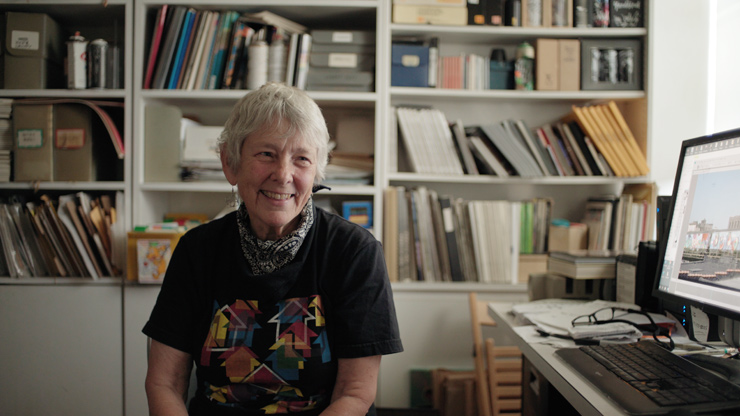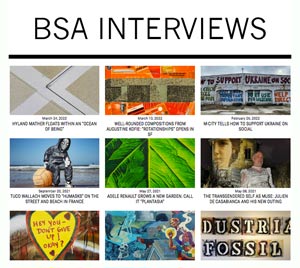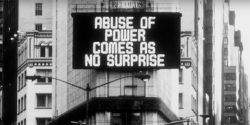The Director Invites You to Participate in the New Documentary
The rising star film director who has captured and woven riveting narratives of artists and graffiti virtuosos like Melbourne’s Sofles and the ultimate train-jumping outlaws 1UP Crew from Berlin – verifiably raising their respective games and profiles in the process – Brisbane’s Selina Miles has been tackling a graffiti/Street Art juggernaut right before our eyes; a full scale movie-length documentary on famed New York photographer Martha Cooper.
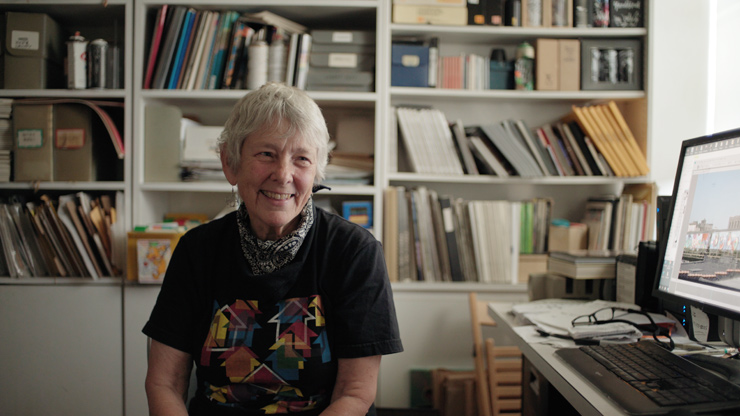
Martha Cooper (photo © Selina Miles)
We knew that these two talented and powerful personalities would compliment each other stunningly and that’s why we encouraged them two years ago to do a doc. A short term one was the original plan. But the two hit it off so well and when you are looking at a five decade career like Ms. Cooper’s and you have the dogged determination to do her story justice, Ms. Miles tells us that even an hour and a half film feels like its just getting started.
Now “Martha” the movie is at a unique juncture in the project and YOU may be able to participate; Selina and the team are looking for any original footage you may want to show them – and it may be used in the documentary.
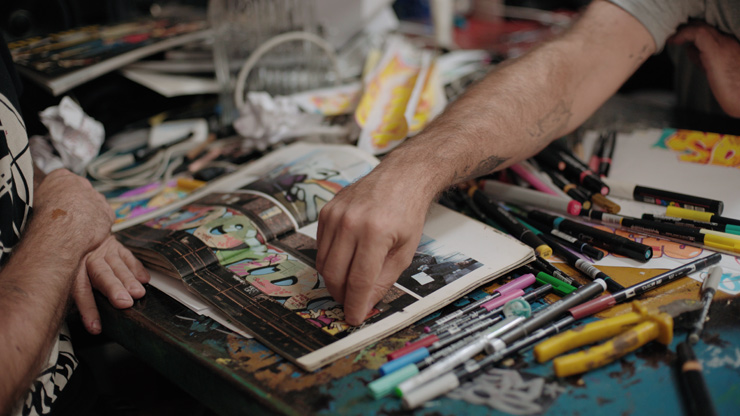
Martha Cooper. Subway Art (photo © Selina Miles)
We have an amazingly involved, interconnected, and brilliant audience of BSA readers across the time zones, so she’s asking you first. Please click this link and let Selina and Martha know if you might have something to show them.
Specifically right now the team is looking for:
1. Historical photos and video of artists interacting with “The Holy Book of Graffiti”, Subway Art, by Martha Cooper and Henry Chalfant, and
2. Modern day footage of Martha Cooper going to any and all lengths to get the shot.
Read more at “Martha” the Movie and please contact them ASAP.
In an exclusive interview director Selina Miles today shares with Martha Cooper fans some unseen images from making the movie. She also gives insights into what it has been like making the biggest movie ever produced about the famed photographer.
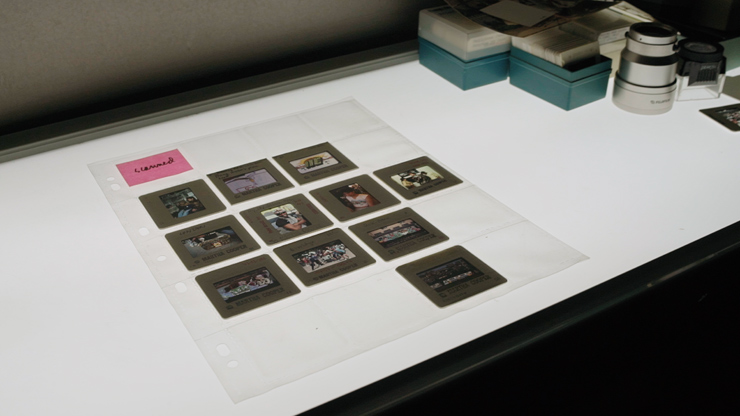
Martha Cooper. Archives. (photo © Selina Miles)
Brooklyn Street Art: What gave you the idea to do a documentary about Marty?
Selina Miles: As with most of us interested in graffiti, I knew of Marty’s book Subway Art from a young age. We first met at ONO’U Tahiti Graffiti Festival in 2014, and I was immediately taken with her approachable, passionate and vibrant character. In 2015, I had been working on a series called “Portrait of an Artist,” an anthology of 10 minute documentaries profiling artists, and a good friend asked me “Who’s next?.” Martha was an obvious choice.
We both returned to Tahiti the following year for the same festival. Seated around a dinner table with a group of artists, I casually asked “When do you think you’ll be in New York next?” she replied “I’m not sure, why?” I ended up asking her right on the spot if I could make a film about her, in front of the whole group. It felt very much like awkwardly asking out a prom date. Luckily she said yes.
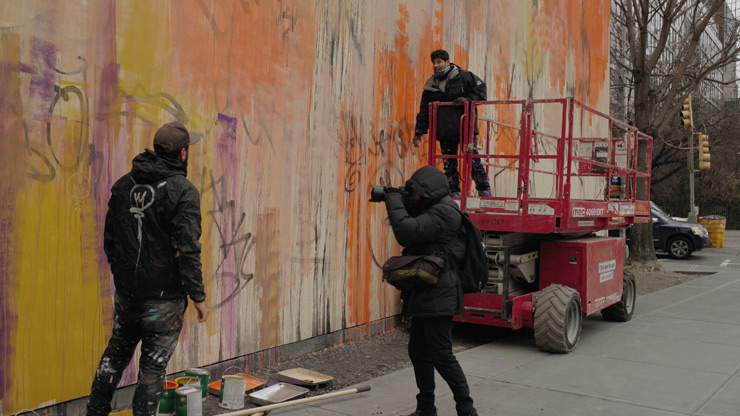
Martha Cooper at work at the Houston/Bowery Wall in NYC with Pichi & Avo. (photo © Selina Miles)
BSA: Is it true that at the start of the project you were thinking of doing a short film?
Selina Miles: The following February, I had just finished directing my biggest TV commercial yet, and wanted to the use bigger-than-usual pay check to do an ambitious project. I booked myself a 2 week trip to New York, as well as a ticket for Marcus Autelli, an amazing cinematographer from London. Our mission was a 10 minute piece.
Like so many fans of Martha’s work, I discovered her through the graffiti subculture. I did my best to research before the trip. I scoured Youtube and Vimeo for videos and interviews with Marty, flicked through Subway Art, pored over Street Play, re-watched Style Wars and thought I had done a pretty good job.
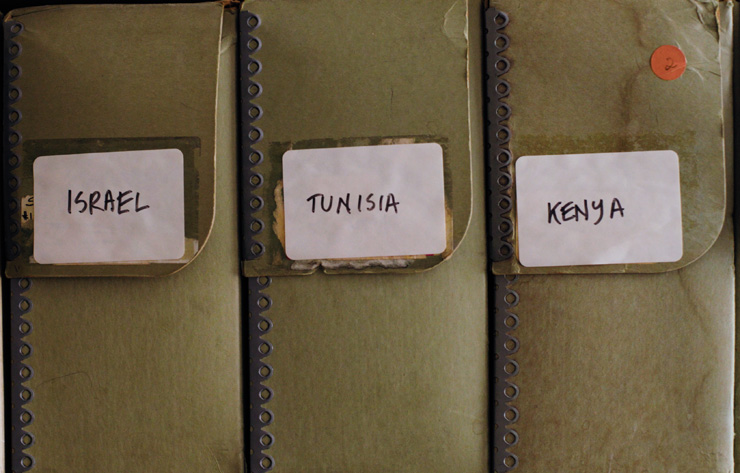
Martha Cooper. Archives. (photo © Selina Miles)
When I arrived in New York, Marty met me at her train station, and together we walked to her studio. She gave me a key and pointed me in the direction of her archives. Large folders lined the shelves. I still remember the first time reading those labels, hand-drawn in Marty’s signature authoritative, all-caps handwriting. “Windsurfing.” “Korea.” “Tunisia.” “Israel.” Each one full to the brim with boxes of Kodachrome mounted slides, stamped and dated.
The first person Martha suggested I interview was her good friend Susan, who flew down from her home in Maine to speak to me. It wasn’t until a few days before the interview that I learned that “Marty’s friend Susan” was actually Susan Welchman, photo editor of the New York Post and of National Geographic Magazine for 35 years. I began to learn of Martha’s incredible, rich photographic career, too often obscured behind the monumental popular reverence for her graffiti work.
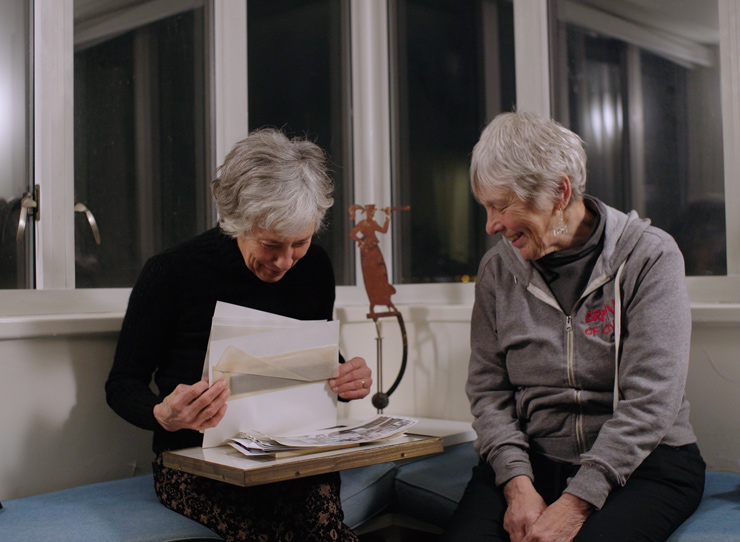
Martha Cooper with her longtime friend Susan Welchman, the former photo editor at The New York Post and Senior Picture Editor at National Geographic (photo © Selina Miles)
I realized with a combination of terror and excitement that I was facing much more than a 10 minute graffiti video. That this was the story of a photographer who had shaped entire generations of a worldwide subculture. A woman whose camera had witnessed historical events from the 1960s until now, whose story was deeply entangled with that of New York City, whose work had touched so many lives across boundaries of time and place and culture. And most importantly, a story that was relatively unknown, absolutely begging to be told, and that Martha had put her faith in me to tell that story.
It was then that I realized that 10 minutes wasn’t going to cut it.
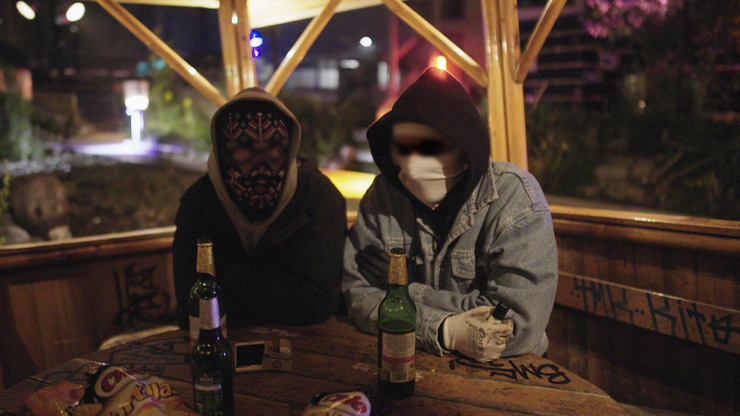
Martha Cooper. Graffiti Writers. (photo © Selina Miles)
BSA: Is there anything call “a typical day” when you are following Marty in her travels?
Selina Miles: There is never a boring moment when you’re with Martha. What she has can’t even be described as work ethic, because she doesn’t see photography as work. It is just who she is, and there is nothing else. She will go anywhere, any time, to any extreme to do the projects she wants to do.
That being said, there are certain consistencies in her days. Any time she is presented with a window of downtime of more than 3.5 seconds, she is playing Pokemon Go. When it comes to food, Marty frequents exactly 2 restaurants in New York, both 4 blocks or less from her apartment. In total she has about 4 dishes on rotation, supplemented on particularly busy days by Lunchables, ready-made snack packs of deli meats and Oreos.
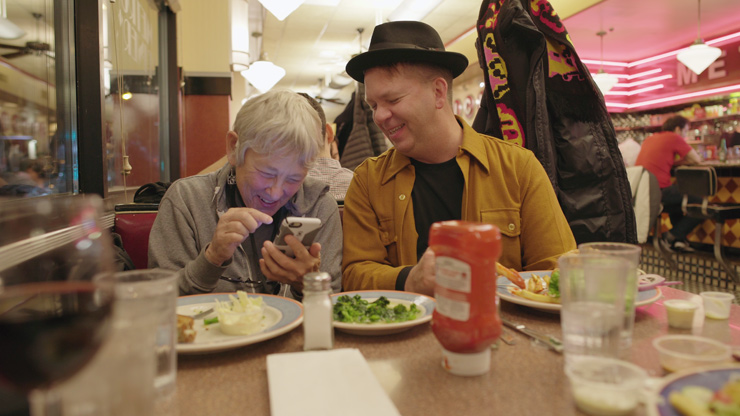
Martha Cooper. Pokemon fun with Steven P. Harrington at Metro Diner in NYC. (photo © Selina Miles)
It is well documented that many successful entrepreneurs and geniuses keep rigid routines or wear the same clothes every day as a way to save precious cognitive resources for what they really love to do. Marty is no exception. My best tip for anyone lucky enough to share a lunch with her – you have about 30 seconds to decide on your order before her patience runs out.
Marty’s life is chaos wrapped in deeply ingrained habit, on a bed of compulsive, obsessive collecting and photo-taking. An ideal combination for a documentary subject.
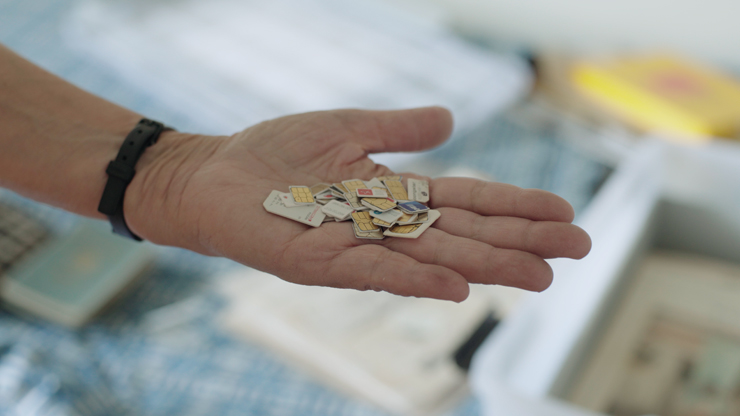
Martha Cooper. SIM cards from her international travels. (photo © Selina Miles)
BSA: You have unprecedented access like no one ever before to the archives of 50 years. It must to have felt overwhelming sometimes.
Selina Miles: Most of my career has focused on making short films where the objective is creating something out of nothing. This project is the opposite. The real challenge is to distill 50 years, 17 published books, hundreds of travel destinations and more than an estimated half a million images into a singular, watchable 90 minutes. In this case, making a good film is as much about what you choose to leave out as what you include.
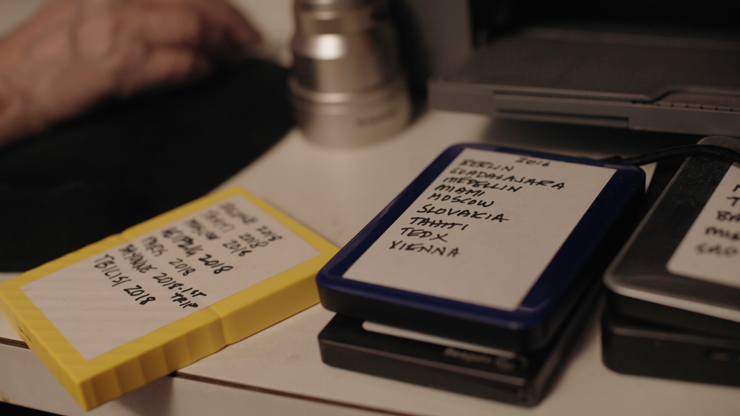
Martha Cooper. Archives. (photo © Selina Miles)
My team and I have collected archive from every major medium, from Super 8 film, to VHS, to DV tapes, to our own 4K video. We have searched high and low over the 19 months working on this project, and there hasn’t been a week that we don’t discover some essential snippet of the story. Friends and colleagues of Marty have sent in material from South Africa, Prague and Germany. Her ex husband’s basement held over 6000 feet of Super 8 home movies, unseen since the ‘80s.
This constant digging and discovery is anxiety inducing, chasing leads that never end, having nightmares of dusty tapes sitting in a basement somewhere that could unlock all the answers if only I could find them. On the flip side, the elation that comes when you find that perfect piece makes it all worth it.
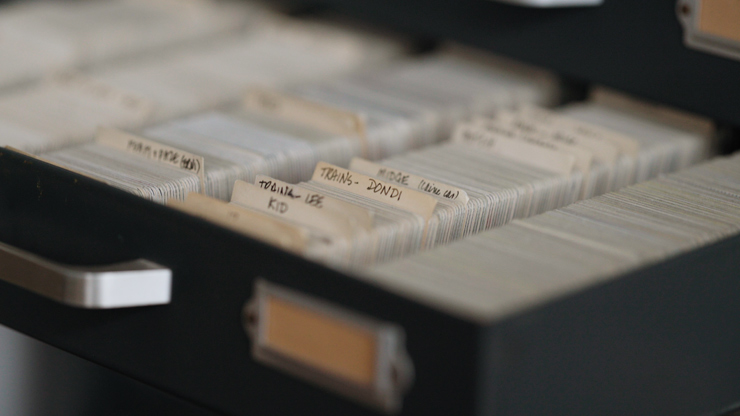
Martha Cooper. Archives. (photo © Selina Miles)
BSA: Were you able to speak to individuals whom you considered to be close to Martha personally or professionally?
Selina Miles: Out of every subject we approached, all but one agreed, the exception being a prominent anti-graffiti policymaker from New York City during the early ‘80s.
I interviewed in 6 cities and had material translated in 4 languages. I spoke to friends and family, peers, cultural commentators, graffiti writers. Each contributor was more varied and vibrant than the last. After the interview, when I would thank each contributor for their time, they would often respond with the same phrase, jumping out at me like a mantra – “Anything for Martha.” It became quite ridiculous how often I heard this exact phrase coming from everyone from kids at the skate park in Baltimore to curators at major New York museums. Access was not an issue on this project.
BSA: Can you share a special insight that you gained one day with her?
Selina Miles: I have been inspired in so many ways by this project, but I would say the most significant lessons I took away from the Marty Cooper approach to life would be to take risks, embrace failure, never grow up, and choose your own path in life. Although it takes place in very fantastical world full of weird and wonderful characters, Marty’s story is full of extremely universal, relatable human experiences, failures and triumphs. I hope that in watching the film, each viewer can find their own insights and take home lessons within her story.
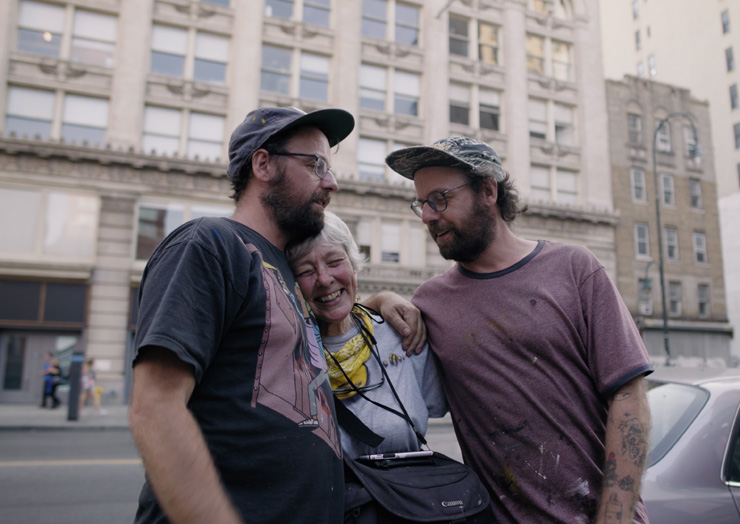
Martha Cooper with the Brazilian twins Os Gemeos. (photo © Selina Miles)
BSA: You live In Australia and Martha lives in Manhattan. How do you make a feature film documentary when you have to travel such long distances?
Selina Miles: Firstly I am very fortunate to have built a freelance career that allows me to work when and where I choose. I can definitely encourage anybody thinking of making that leap to go for it. Not having a boss that you need to ask for time off makes it much easier. Secondly, being Australian you get really used to working weird time zones and traveling long distances. Modern aviation is a wonderful thing! Get on a plane, fall asleep for 14 hours, wake up and you’re in a different country! How cool is that!

Martha Cooper. Archives. (photo © Selina Miles)
Our world is so connected now, and filmmaking has become infinitely easier than it was for previous generations. Martha Cooper traveled the world photographing for National Geographic before the days of digital photography. She would have to physically purchase, carry, store, develop and print the hundreds of thousands of exposures of film required for one story.
She constantly battled against the physical mass and cost of that medium. This made photography or filmmaking accessible only to those with a formal education and money. We don’t have any of those issues anymore, anyone can walk into a store and purchase a $500 camera and a hard drive and start a career as a photographer or a documentary filmmaker. This project has given me a greater appreciation for how easy we have it now, and for the skill that was required to shoot on film.
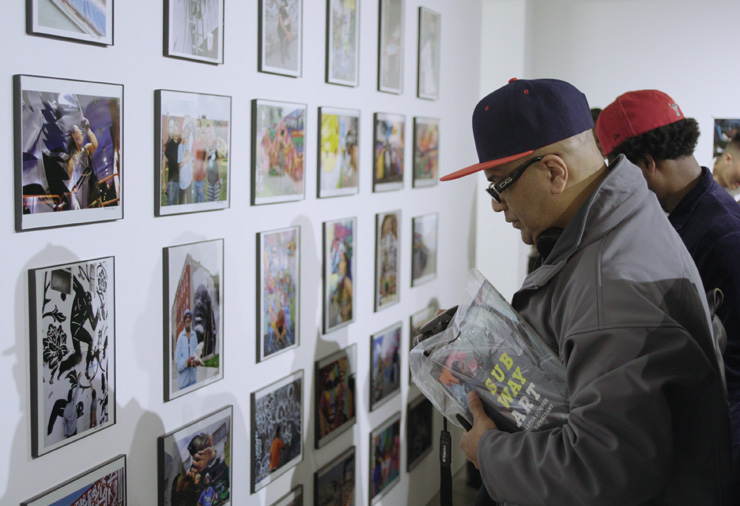
A Subway Art fan clutching his copy close while looking at some of Martha Cooper’s more recent Street Art photography. (photo © Selina Miles)
BSA: Martha was one of the first documentors of the graffiti scene. What will the audience learn about how Martha first found out that she wanted to document the graffiti movement?
Selina Miles: It is my firm belief that I cannot make a film that will do anything for the documentation of early graffiti that wasn’t done by Style Wars in 1983, but I hope that the graffiti community leaves this film feeling well represented, and with greater context of how Martha Cooper became the legend we regard today.
BSA: How can people help you complete your film?
Selina Miles: Right now we are wrapping up our last month of post production, and searchin over the last few weeks we have been able to dig for new archival material. If anybody out there has footage of Marty, no matter what quality or how big or small, please send it to me! It might be just the bit that I am missing.
Marty’s story is such an international one, it’s so great to receive clips showing her at work in different locations around the world. Every little bit helps really bring to life the incredible bond that is shared within the graffiti and street art communities.
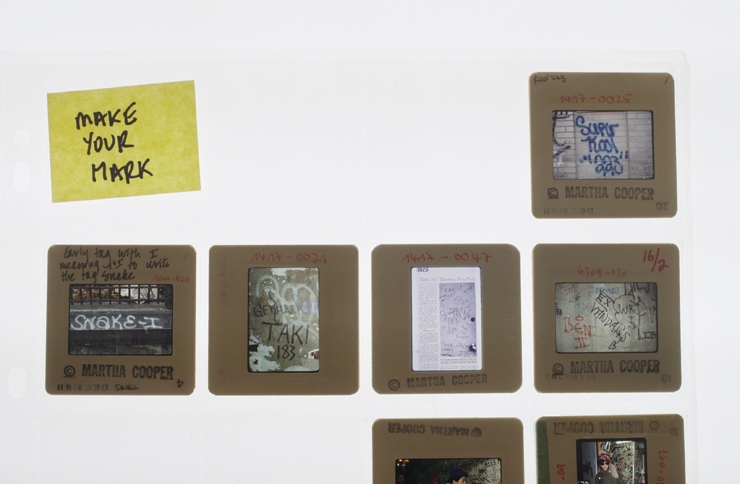
Martha Cooper. Archives. (photo © Selina Miles)
The slides of early tags were a selection for a chapter in Martha’s book “Hip Hop Files”. “Make Your Mark” was a possible chapter heading she and the publisher eventually decided not to use. It comes from a 1982 anti-graffiti poster Koch put in the subways saying “Make your mark in society not on society.” It became a joke among graff writers, still remembered and quoted today.
Please click this link and let Selina and Martha know you might have something to show them.
Specifically right now the team is looking for:
1. Historical photos and video of artists interacting with “The Holy Book of Graffiti”, Subway Art, by Martha Cooper and Henry Chalfant, and
2. Modern day footage of Martha Cooper going to any and all lengths to get the shot.
Read more at ” ‘Martha’ the Movie’ ” and please contact them ASAP.
Other Articles You May Like from BSA:
Photographer Fer Alcala recently explored an abandoned place known to some as Fraggle Rock with Street Artist/graffiti writer DavidL, who is specializing in personality infused portraits of cinematic ...
Our weekly interview with the street El Coucho has a certain savoir-faire, don de gente (El Coucho) (photo Jaime Rojo) Clayton and Maybelle still remember their first blind date. (Pe...
Paris, like many cosmopolitan cities around the world is mostly a pedestrian city – with about 60% of journeys are by foot rather than by car. With this in mind the city's urban planners have been foc...
It's a February pile-on this week with dangerous sub-zero wind chills on the street, Valentine's Day smashing into Presidents Day, a Brooklyn Jew winning the New Hampshire primary against a former...
Topical and timely, street artist INO has the scoop on global warming right now at the Bloop Festival in Ibiza, Spain. INO "Melting Earth". Bloop Festival 2017. Ibiza, Spain. July 2017. (photo © Mr...
 BROOKLYN STREET ART LOVES YOU MORE EVERY DAY
BROOKLYN STREET ART LOVES YOU MORE EVERY DAY